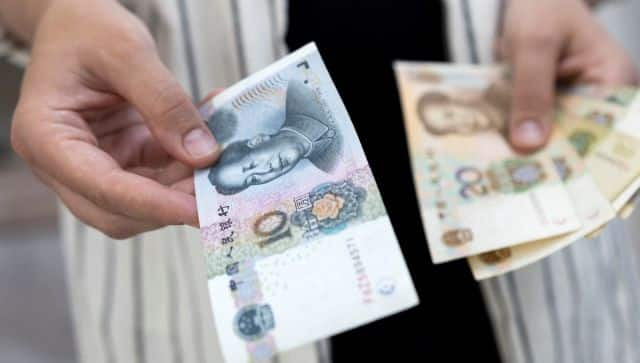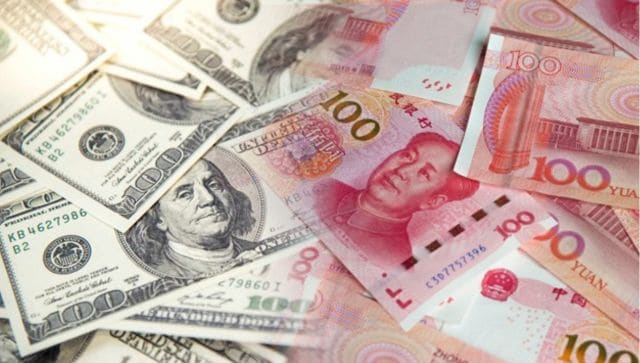Can Chinese yuan drub US dollar to become the most dominant currency? (firstpost.com)
FP Explainers April 05, 2023 15:02:37 IST

The Chinese yuan can come to par with the US dollar in the global trade markets in the coming future, say experts. Reuters (Representational Image)
The rising influence of China’s currency yuan has prompted questions about whether it can oust the US dollar as the world’s dominant currency.
As per a Bloomberg report on Tuesday (4 April), the yuan has replaced the US dollar as the most traded currency in Russia.
Let’s take a closer look at the rise of the Chinese currency globally and if it can overthrow the US dollar.
Yuan topples US dollar in Russia
Russia turned to China’s currency amid Western sanctions following Moscow’s invasion of Ukraine last February.
According to Bloomberg, the yuan put the dollar behind in monthly trading volume this February in Russia, increasing further in March.
Before Russia’s war in Ukraine, the yuan had a negligible trading volume in the Russian market, noted Bloomberg.

Western sanctions targeting Russia’s financial system pressured the Kremlin and Russian companies to shift their foreign-trade payments from the dollar and euro with alternative currencies.
Beijing has also provided a market for Russian goods as Western sanctions sting Moscow.
The trade relations between the Russia and China have grown after the Ukraine war.
Trade between the two nations touched a record $190 billion last year, with most of these transactions in Chinese and Russian currencies, reported Al Jazeera.
ALSO READ: Will a new BRICS currency replace the US currency for trade?
Dumping dollar, accepting yuan
Though US dollar continues to lead global trade market, countries have started using other alternative currencies for foreign trade and settlement.
China has expressed interest in setting up Asian Monetary Fund to reduce reliance on the US dollar and the International Monetary Fund (IMF), Malaysian prime minister Datuk Seri Anwar Ibrahim said in Parliament on Tuesday (4 April).
“There is no reason for Malaysia to continue depending on the dollar,” Anwar was quoted as saying by Bloomberg.
The Malaysian leader also stated that the country’s central bank is chalking out plans to negotiate trade matters using the ringgit (Malaysia’s currency) and yuan, reported Bloomberg.
It’s not just Malaysia that wants to ditch the US dollar to water down America’s influence over the world economy.
Brazil recently green-lit yuan for trade settlements and investments with Beijing. Reuters reported on 31 March that the yuan has emerged as the second most important currency in Brazilian foreign reserves, surpassing the euro.
The Chinese currency, which did not have a share in Brazil’s foreign reserves till 2018, accounted for 5.37 per cent of Brazilian central bank holdings by the end of 2022.
However, the US dollar still commanded Brazil’s total foreign reserves last year, with 80.42 per cent share.
Earlier in March, Saudi Arabia said it is open to talks to sell its oil in currencies other than the dollar. As per The Wall Street Journal report, the oil-rich nation is also in discussions with China to accept yuan for some of its oil sales.
Last July, Iran said it has completely abandoned the US dollar for its trade with Russia and would adopt Russian ruble for transactions. It also announced it has similar plans for trade with India, Turkey and China.
China, Indonesia, Malaysia, Hong Kong, Singapore, and Chile decided to contribute 15 billion yuan (around $2.2 billion) to the Renminbi Liquidity Arrangement in July 2022.
Beijing has also been promoting local currency in trade settlement and finance through BRICS collective, consisting of Brazil, Russia, India, China and South Africa.
China’s central bank has approved 31 yuan-clearing banks in 29 countries or regions.
In recent years, China has reported “double-digit growth in yuan-denominated trade settlement and investment”, as per South China Morning Post (SCMP).
As per China’s Ministry of Commerce, commodity trade worth around 7.92 trillion yuan (US$1.15 trillion) was settled in yuan in 2022, a surge of 37.3 per cent from a year before.
Will yuan replace US dollar?
Not for now, at least.
Economists Barry Eichengreen of the University of California Berkeley and Camille Macaire of France’s central bank said in a study that replacing the US dollar will not be a cakewalk for the yuan.
They also noted that yuan reserves are seeing a gradual uptick in nations that have close trade relations with China, reported Yahoo Finance.

The yuan accounted for 2.7 per cent of the total foreign-exchange reserves last year, Bloomberg reported citing IMF data.
The study also said the Chinese currency could become an alternative to the US dollar in a “multipolar” world and this parity with the greenback could happen in a few decades.
“China has already helped launch the Asian Infrastructure Investment Bank (AIIB) as an alternative to the World Bank within the Asian region. If it can indeed tackle the influence of the World Bank and IMF within the region, it might be possible for the yuan to become competitive against the US dollar in the long run,” Dr MM Akash, Chairman, Department of Economics, University of Dhaka, told Bangladesh’s daily newspaper The Business Standard.
Nouriel Roubini, the chief economist at Atlas Capital Team, wrote in The Financial Times in February that the US has taken steps that reduced “the appeal of dollar assets among foes and relative friends.”
“These include financial sanctions against its rivals, restrictions to inward investment in many national security-sensitive sectors and firms, and even secondary sanctions against friends who violate the primary ones,” Roubini, known as Dr Doom economist, said.
However, certain obstacles can hamper yuan’s growth in toppling US dollar as the world’s reserve currency, including its strict currency controls.
The lack of transparency in the economic policy of China and Russia can also spook countries to adopt them against the US dollar for foreign trade.
“When it comes to the (Russian) Ruble or the renminbi (yuan), you cannot rely on the transparency of (Vladimir) Putin or Xi Jinping. Since the decision-making process in these countries is rather undemocratic, it is difficult for traders to rely on these currencies as reliable alternatives” Dr Zaidi Sattar, Chairman of Bangladesh’s Policy Research Institute, told The Business Standard.
Top economist Paul Krugman has also rebuffed concerns of the Chinese yuan ending the dominance of the US dollar in the global financial system, saying in a New York Times op-ed that he does not expect this to happen anytime soon.
With inputs from agencies
Leave a Reply
You must be logged in to post a comment.